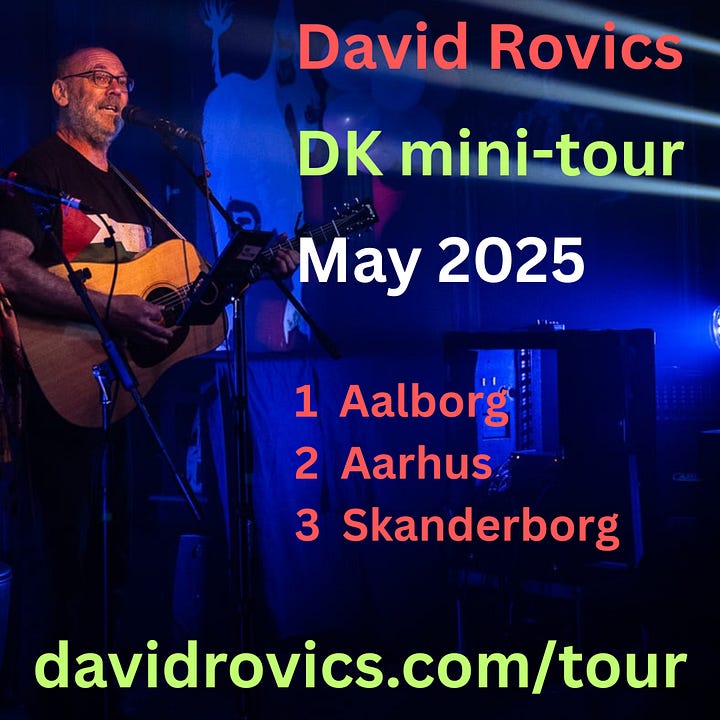Remembering Petter Naess
If you've heard the Ministry of Culture play in Oslo over the past few years, you've quite likely heard Petter Naess's voice, guitar, and jaw harp.
First of all, apparently Petter Naess is a fairly common Norwegian name, so the one you know might still be alive. But the one I knew was evidently born in 1951, and died on March 29th, 2025.
Petter was quite a preeminent scholar of urban planning, from what I gather. This certainly seemed evident in conversation, not that he ever bragged about his achievements, but it was clear that he was deeply knowledgeable in his field.
As one might expect of a Norwegian professor of urban planning, Petter lived in a beautiful housing cooperative and rode a bicycle everywhere. As with his fellow Norwegians, he never let the weather get in the way, since he had the right clothing to stay dry while bicycling through whatever the sky had to offer.
I became familiar with such details of Petter's life over recent years because every time I was planning to come back to Norway, Petter was intent on organizing another concert for me and his band in Oslo, most recently a few months ago at Cafe Mir.
When I first met Petter he was teaching in Aalborg, Denmark. Every year I was coming to Aalborg to play at the punk rock social center, 1000Fryd, and every year there would be a tall, thin, dark-haired Norwegian man among the mostly Danish audience.
He got a job teaching in Oslo and eventually I'd see him at shows there instead, and eventually he became that tall, thin, white-haired Norwegian professor instead.
It was around four years ago, as memory and my record of emails we've exchanged seems to indicate, which coincided with his semi-retirement from the university, that Petter got into playing music and writing songs again.
He contacted old friends that he had formed a band with in 1975, called Folk Flest. Norway is long, and the other band members lived in parts of the country nowhere near the capital, but they started up a new tradition of doing annual shows in Oslo with me and Kamala anyway.
Petter was one of the most athletic guys in their seventies that I knew, and I'm sure I'm not the only one who is shocked he died so young. I was truly expecting to be seeing him around for at least another twenty years. I gather he died while literally running through the forest as part of an orienteering event, which sounds a bit like a fast-paced Easter Egg hunt for adults, as far as I can tell.
Petter lived in an eastern neighborhood of Oslo that was once downwind from industry, as the east sides of so many cities generally used to be. It's a high-altitude neighborhood with a big vista of the city, just on the edge of a forest. From Petter's home, the forest is very close. He knew it well, and took Kamala and I hiking in it on one memorable occasion.
The second-to-last show Petter organized for us at Cafe Mir was especially memorable because the night of the gig happened to coincide with the day Stella Assange was receiving an award on behalf of her then-still-imprisoned husband, and Stella and crew came to the show, where filmmaker Niels Ladefoged managed to make a viral video of Julian phoning Stella while Kamala and I were singing a song about them.
I believe many of the songs Folk Flest were doing at our shows together in recent years were songs they had first written in the 1970's. Here's one from the last show we did together in Oslo, a song just as relevant as it ever was, unfortunately, on a subject that very few artists in much of the west dare to speak out on -- "Free Palestine."




I appreciate this tribute Dave. Always good to acknowledge worthy people. Speaking of which, this was forwarded to me by a colleague and it reminded me so much of MLK's "Letter from a Birmingham Jail."
-- Forwarded message ---------
From: Roy Eidelson <reidelson@gmail.com>
Date: Sun, Apr 20, 2025 at 12:29 PM
Subject: [peace-psychology] “Mahmoud Khalil: What does my detention by ICE say about America?”
To: Peace Psychology <peace-psychology@googlegroups.com>
I’m surprised the Washington Post published this op-ed, but I’m glad they did.
Roy
https://www.washingtonpost.com/opinions/2025/04/17/mahmoud-khalil-columbia-student-ice-detention/
Mahmoud Khalil: What does my detention by ICE say about America?
A democracy for some is no democracy at all.
April 17, 2025
By Mahmoud Khalil
Mahmoud Khalil is a recent Palestinian graduate of Columbia University.
It’s 3 a.m. as I lie sleepless on a bunk bed in Jena, Louisiana, far from my wife, Noor, who will give birth to our baby in two weeks. The sound of rain hitting the metal roof masks the snoring of 70 men tossing and turning on hard mats in this detention facility run by Immigration and Customs Enforcement. Which ones are dreaming about reuniting with their families? Which ones are having nightmares about becoming the Trump administration’s next “administrative error”?
Last Friday, I sat in a courtroom as an immigration judge determined that the government could deport me despite my status as a legal permanent resident and despite that the government’s claims against me were baseless — much of its “evidence” lifted directly from sensationalized tabloids. The decision won’t result in immediate deportation — aspects of my case are pending in other courts.
Earlier that day, I sifted through letters from supporters. Two postage stamps displayed the American flag, one stating “liberty forever,” the other proclaiming “justice forever.” The irony is stunning, especially regarding what I’ve learned about how the administration exploits immigration law to enforce its repressive agenda. I think about the breakneck speed with which my case was heard and decided, running roughshod over due process. On the flip side, I think about those I am locked up with, many of whom have been languishing for months or years waiting for their “due process.”
During Friday’s hearing, the government asserted on behalf of Secretary of State Marco Rubio that my beliefs, statements and associations compromise its “compelling” foreign policy interests. Like the thousands of students that I advocated with at Columbia — including Muslim, Jewish and Christian friends — I believe in the innate equality of all human beings. I believe in human dignity. I believe in the right of my people to look at the blue sky and not fear an impending missile.
Why should protesting Israel’s indiscriminate killing of thousands of innocent Palestinians result in the erosion of my constitutional rights?
My lawyers have mentioned that a case called Endo might bear on my own. Days later, in my research at a law library, I uncovered the human story behind the legal abstraction. Mitsuye Endo, a Japanese American woman incarcerated during World War II, challenged her captors and brought her case to the Supreme Court. Her victory helped secure the release of thousands of others.
The incarceration of 70,000 American citizens of Japanese descent is a reminder that rhetoric of justice and freedom obscures the reality that, all too often, America has been a democracy of convenience. Rights are granted to those who align with power. For the poor, for people of color, for those who resist injustice, rights are but words written on water. The right to free speech when it comes to Palestine has always been exceptionally weak. Even so, the crackdown on universities and students reveals just how afraid the White House is of the idea of Palestine’s freedom entering the mainstream. Why else would Trump officials not only attempt to deport me but also intentionally mislead the public about who I am and what I stand for?
I pick up my copy of Viktor Frankl’s “Man’s Search for Meaning.” I feel ashamed to compare my conditions in ICE detention to Nazi concentration camps, yet, some aspects of Frankl’s experience resonate: not knowing what fate awaits me; seeing resignation and defeat in my fellow detainees. Frankl wrote from the lens of a psychologist. I wonder whether Hussam Abu Safiya, a renowned hospital director who was abducted in Gaza by Israeli occupying forces on Dec. 27 and, according to his lawyer from the Al Mezan Center for Human Rights, has endured beatings, electric shocks and solitary confinement, will write about his ordeal from a medical perspective.
It’s almost 4 a.m. Thunder crashes. A few rows away, one man hugs a bottle of hot water in a sock for warmth. His prayer mat serves as a blanket, and his head rests on his shoes. A detainee who was praying all night finally lies down. He was caught crossing the border with his pregnant wife and has never seen his baby, now 9 months old. I try to convince myself that this will not be my fate, though Friday’s ruling makes that possibility more real than I want to admit.
I write this letter as the sun rises, hoping that the suspension of my rights will raise alarm bells that yours are already in jeopardy. I hope it will inspire your outrage that the most basic human instinct, to protest shameless massacre, is being repressed by obscure laws, racist propaganda and a state terrified of an awakened public. I hope this writing will startle you into understanding that a democracy for some — a democracy of convenience — is no democracy at all. I hope it will shake you into acting before it is too late.
Roy J. Eidelson, Ph.D.
www.royeidelson.com
President, Society for the Study of Peace, Conflict, and Violence (APA Division 48)
www.peacepsychology.org
Member, Coalition for an Ethical Psychology
www.ethicalpsychology.org
Past President, Psychologists for Social Responsibility
610-513-8685
Doing Harm: How the World’s Largest Psychological Association Lost Its Way in the War on Terror is now available from McGill-Queen’s University Press, Bookshop.org, Amazon, and other outlets.